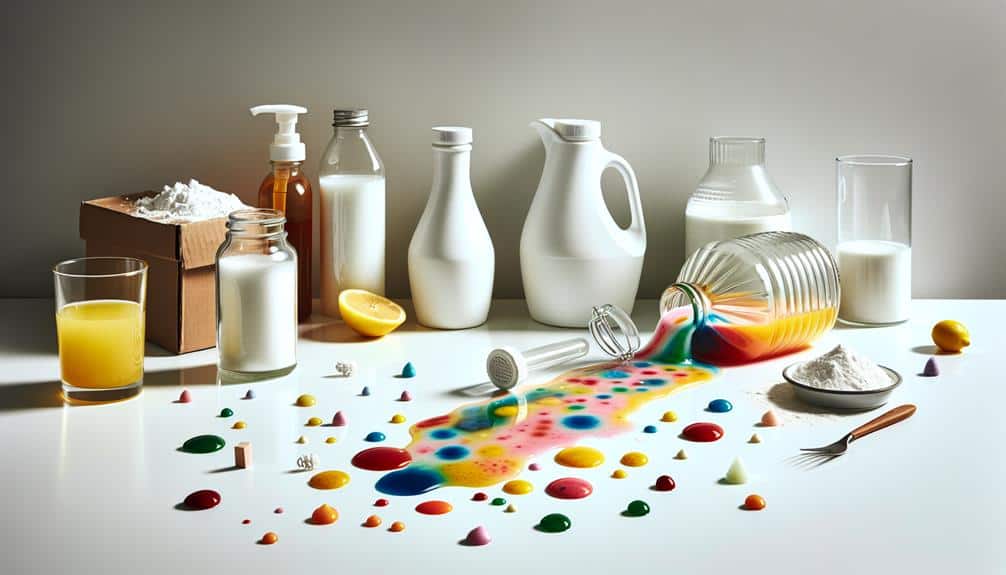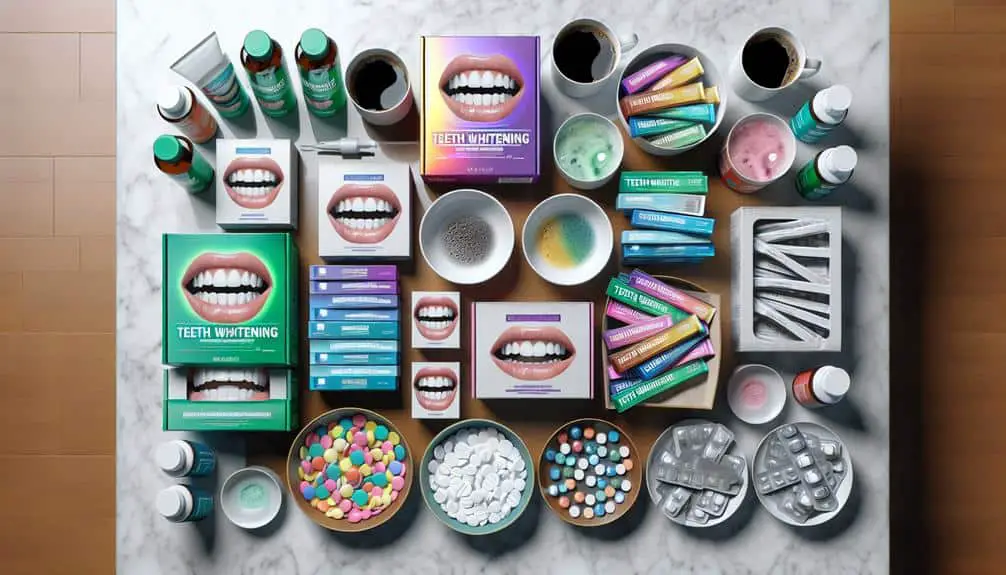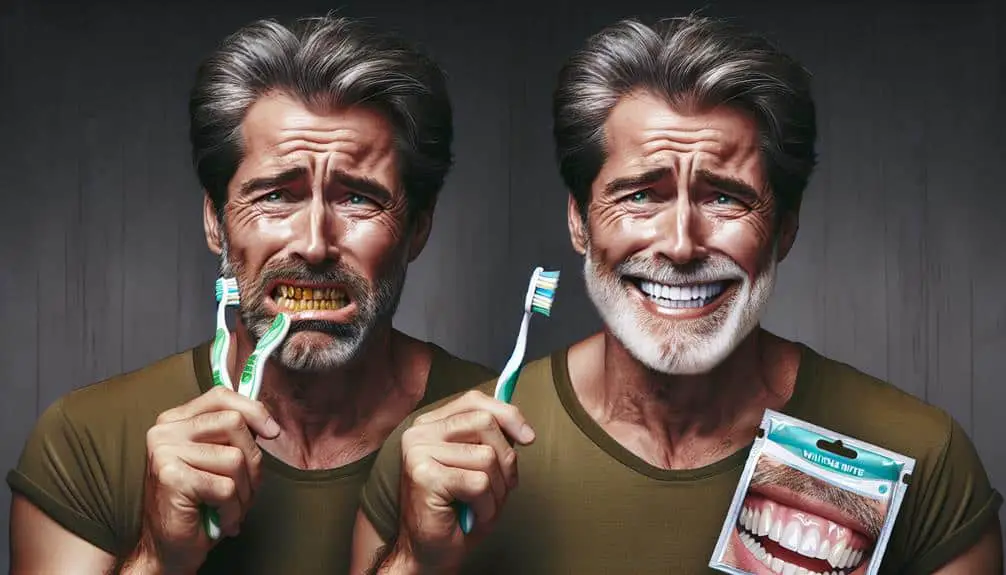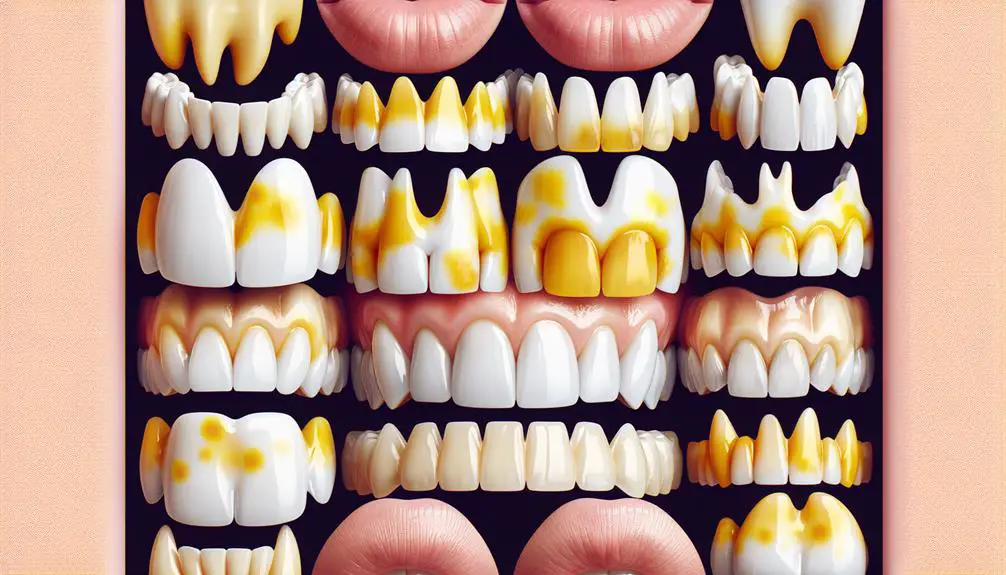To tackle medication stains on your skin naturally, try these powerful remedies. Brighten skin with a Lemon and Baking Soda Scrub. Cleanse with Coconut Oil Pulling to prevent plaque buildup. Apply a Turmeric Paste for healing and lightening effects. Try a Strawberry and Salt Rub for exfoliation. Hydrate skin post-scrubbing. A gentle Apple Cider Vinegar Rinse is great for skin. Dilute it to avoid irritation. Moisturize after rinsing. Using these remedies consistently can bring back your skin's natural glow.
Key Points
- Lemon and Baking Soda Scrub lightens stains and has antibacterial properties for skin cleansing.
- Coconut Oil Pulling removes toxins, prevents plaque, and freshens breath naturally.
- Turmeric Paste Application with curcumin aids in skin healing and lightening medication stains.
- Strawberry and Salt Rub exfoliates dead skin cells and brightens skin with vitamin C.
- Apple Cider Vinegar Rinse dilutes for skin safety, hydrates, and is effective for stain removal.
Lemon and Baking Soda Scrub
To effectively remove medication stains, consider using a powerful yet gentle scrub made from lemon and baking soda. The Benefits of lemon in this Citrus exfoliation scrub are plentiful. Lemons contain citric acid, which acts as a natural exfoliant, removing dead skin cells and brightening the skin. The acidity in lemons also helps to lighten stains and discoloration caused by medications. Additionally, lemons have antibacterial properties that can help cleanse the skin and prevent further breakouts.
Baking soda benefits complement the Citrus exfoliation of lemons in this Homemade scrub. Baking soda is a gentle abrasive that aids in scrubbing away stains without being too harsh on the skin. It also helps to balance the pH levels of the skin, promoting a healthy skin barrier. When combined with lemon, baking soda creates a powerful yet safe scrub that effectively tackles medication stains while leaving your skin feeling fresh and rejuvenated.
Coconut Oil Pulling
Consider incorporating coconut oil pulling into your routine as a natural remedy for medication stain exposure. Oil pulling benefits include its ability to remove toxins from the mouth and promote overall oral health. This ancient Ayurvedic practice involves swishing a tablespoon of coconut oil around in your mouth for about 15-20 minutes, then spitting it out.
Coconut oil pulling works by pulling bacteria and other debris from your mouth, helping to prevent plaque buildup and reduce the risk of gum disease. The lauric acid present in coconut oil has antimicrobial properties that can aid in maintaining a healthy mouth environment. Additionally, oil pulling can help freshen breath and whiten teeth naturally.
To incorporate coconut oil pulling into your routine, simply take a spoonful of coconut oil, swish it around in your mouth, and then spit it out. Make sure not to swallow the oil, as it will contain harmful bacteria. Practice this daily for best oral health benefits.
Turmeric Paste Application
When seeking to address medication stain exposure, another effective natural remedy to consider is the application of turmeric paste on the affected areas. Turmeric, renowned for its potent anti-inflammatory and antioxidant properties, can assist in lightening and removing stains caused by medications.
To make a turmeric paste, combine turmeric powder with water or coconut oil to create a thick, uniform mixture. Apply this paste directly to the stained areas and let it sit for about 5-10 minutes before gently scrubbing it off with warm water. The curcumin compound in turmeric helps in reducing inflammation and promoting skin healing, making it a beneficial ingredient for skincare remedies.
When using turmeric paste, make sure that you're using a high-quality turmeric powder to maximize its benefits. Additionally, be mindful as turmeric can stain clothing and skin temporarily. Nevertheless, this natural remedy is gentle on the skin and can be repeated daily until you achieve the desired results.
Incorporating turmeric paste application techniques into your skincare routine can help reduce medication stains effectively and naturally.
Strawberry and Salt Rub
For an effective and ideal approach to addressing medication stain exposure, consider incorporating the strawberry and salt rub technique into your skincare routine. This sugar scrub exfoliation technique combines the exfoliating properties of salt with the skin-brightening benefits of vitamin C found in strawberries.
To create this scrub, mash together a few ripe strawberries with a sprinkle of salt until you have a gritty paste. Gently massage this mixture onto the affected areas in circular motions for about 2-3 minutes, then rinse off with lukewarm water. The salt helps slough off dead skin cells, while the vitamin C in strawberries works to lighten and brighten the skin, reducing the appearance of medication stains over time.
Remember to moisturize your skin after using the scrub to keep it hydrated and nourished. Incorporate this strawberry and salt rub into your skincare routine regularly for best results in fading medication stains and achieving a smoother complexion.
Apple Cider Vinegar Rinse
To effectively combat medication stains on your skin, incorporate an apple cider vinegar rinse into your skincare regimen. Apple cider vinegar is a natural remedy that can help remove medication stains effectively. When using this rinse, follow these tips for the best results:
- Dilution: Always dilute apple cider vinegar with water to prevent skin irritation.
- Gentle Application: Apply the mixture gently to the affected areas using a soft cloth or cotton pad.
- Rinsing: After applying the rinse, make sure to rinse your skin thoroughly with water.
- Moisturize: Follow up with a gentle moisturizer to keep your skin hydrated.
- Consistency: For optimal results, use the apple cider vinegar rinse regularly as part of your skincare routine.
In addition to using apple cider vinegar on your skin, consider incorporating it into your hair care routine as well. A scalp massage with diluted apple cider vinegar can help remove medication stains from your scalp, while using it as a hair mask can promote overall hair health.
Frequently Asked Questions
Can These Natural Remedies Be Used on All Types of Medication Stains, Including Those Caused by Prescription Medications?
Yes, these natural remedies are effective on all types of medication stains, including those from prescription medications. They contain safe ingredients and are gentle on various fabric types. However, be cautious if you have allergies.
Are There Any Potential Side Effects or Risks Associated With Using These Natural Remedies for Medication Stain Exposure?
When utilizing natural remedies for medication stain exposure, it's important to be cautious of potential risks. Safety measures are vital, particularly for those with skin sensitivity. Guarantee effectiveness without compromising safety by being knowledgeable.
How Often Should These Natural Remedies Be Used to Effectively Remove Medication Stains?
To effectively remove medication stains, use natural remedies consistently. Frequency of use impacts effectiveness over time. Incorporate these remedies into your cleaning routine regularly for best results. Consistent application helps in gradually fading medication stains.
Can These Natural Remedies Be Used on Sensitive Skin Without Causing Irritation or Adverse Reactions?
When dealing with skin sensitivity, it's essential to test natural remedies on a small patch first. Allergies can trigger adverse reactions, so proceed with caution. Always consult a healthcare professional before trying new natural treatments.
Are There Any Specific Precautions or Considerations to Keep in Mind When Using These Natural Remedies for Medication Stain Exposure?
When using natural remedies for medication stain exposure, consider prevention strategies and alternative treatments. Pay attention to application techniques to avoid long-term effects. Be cautious with sensitive skin. Consult a professional for guidance.



